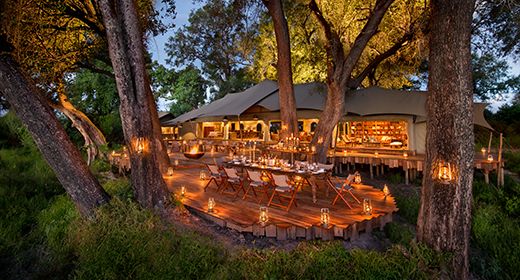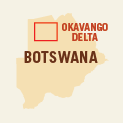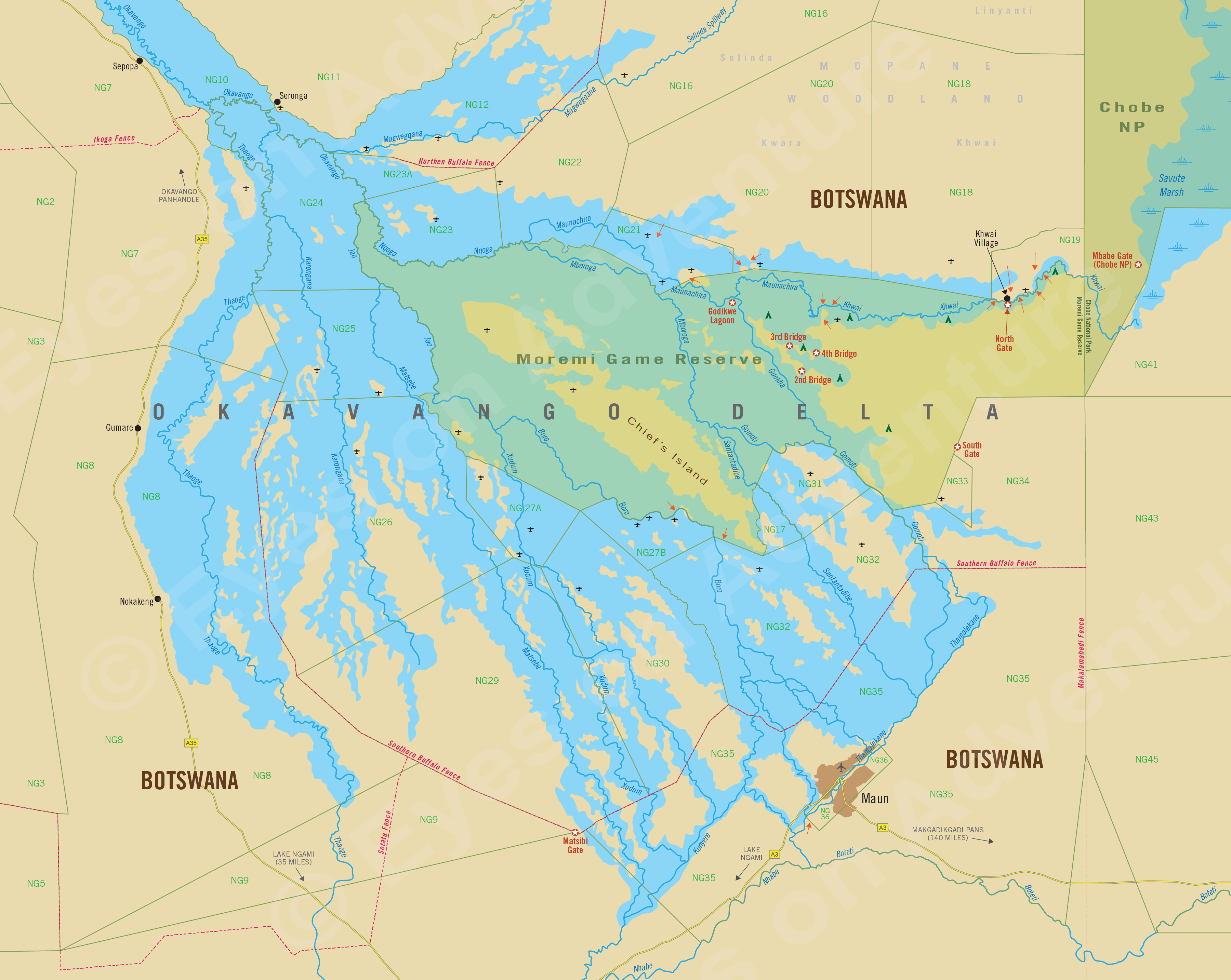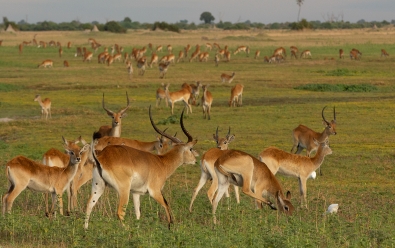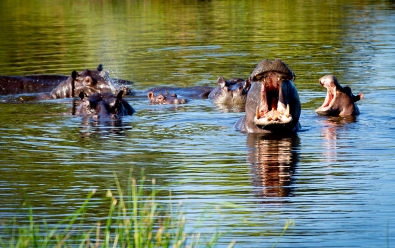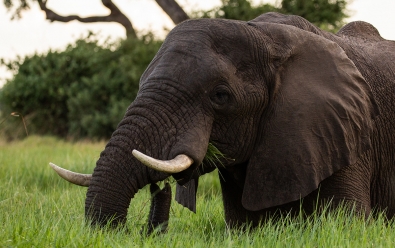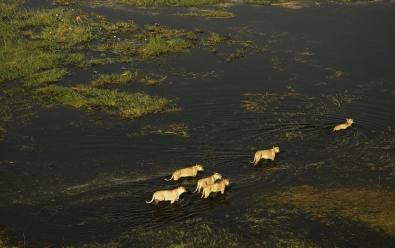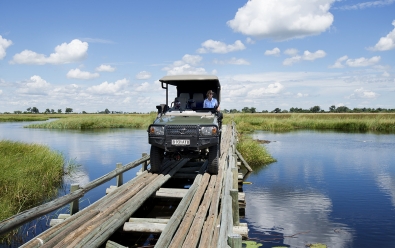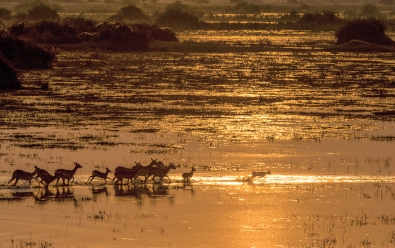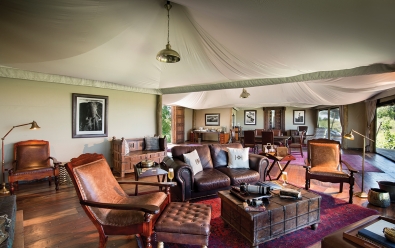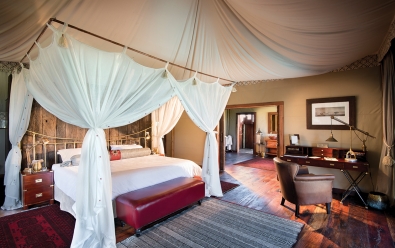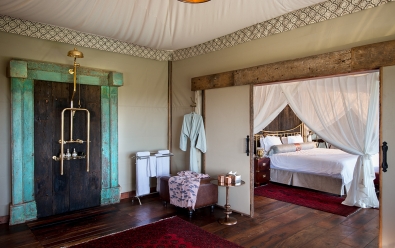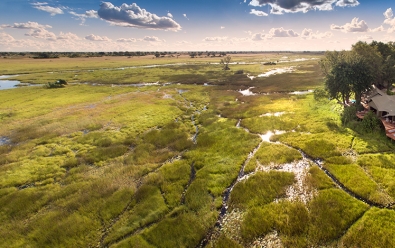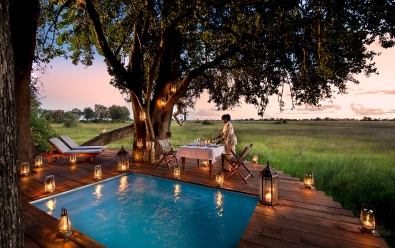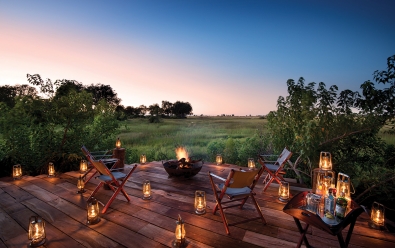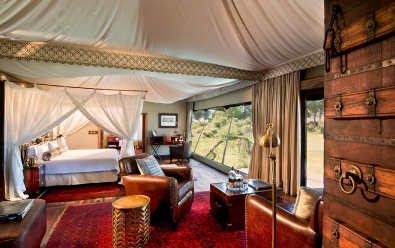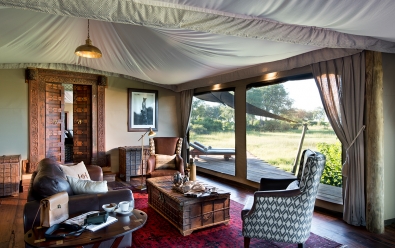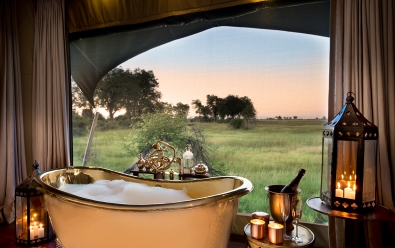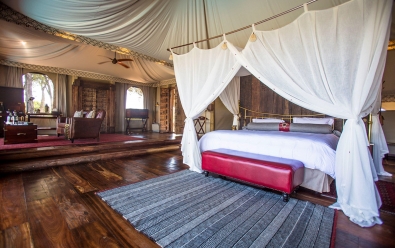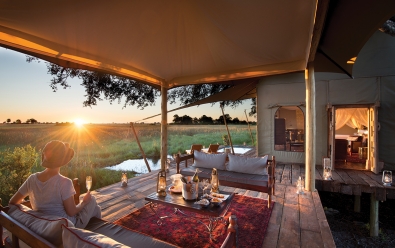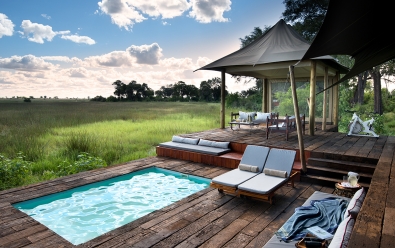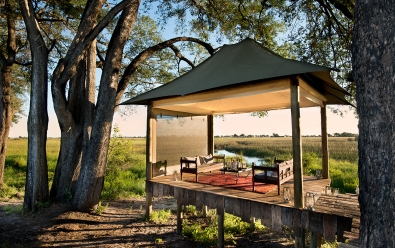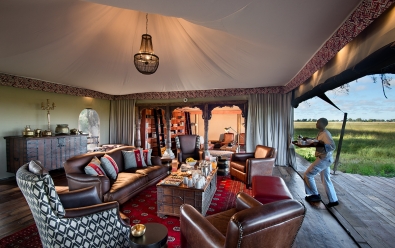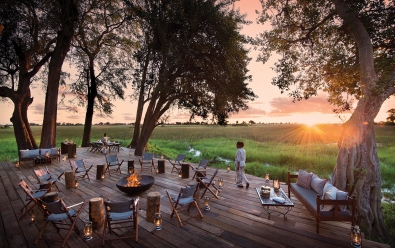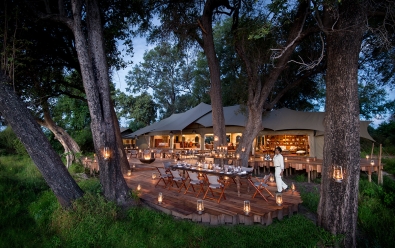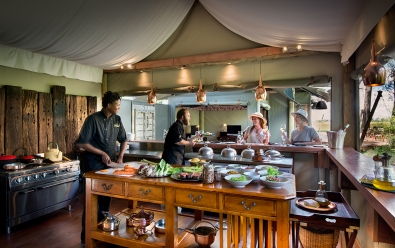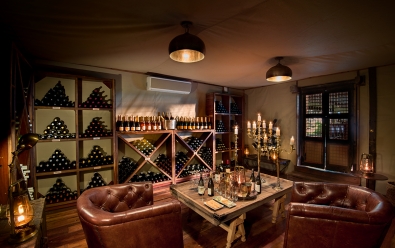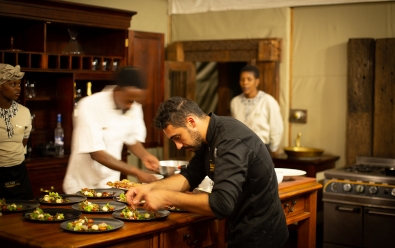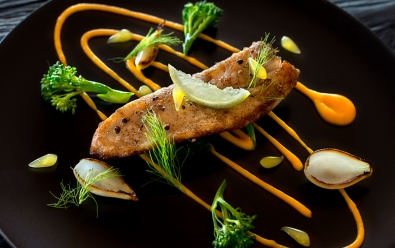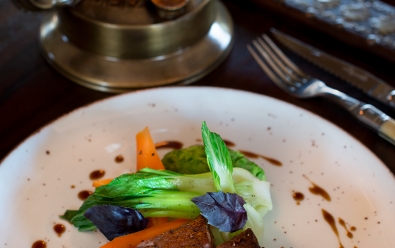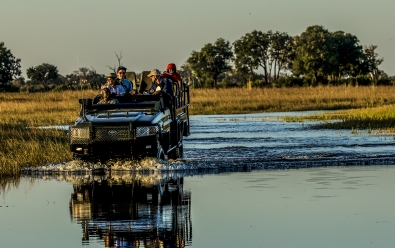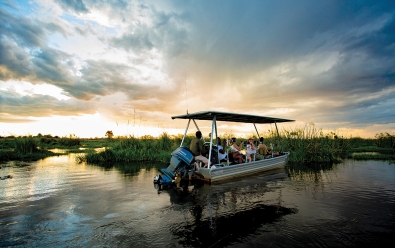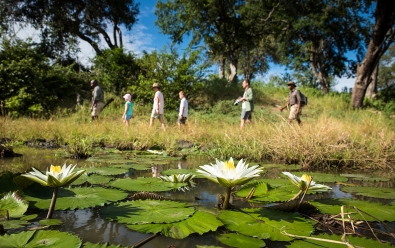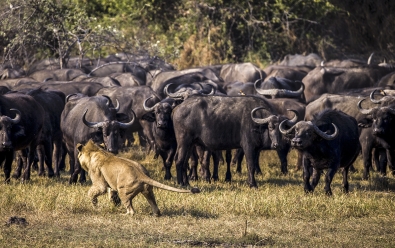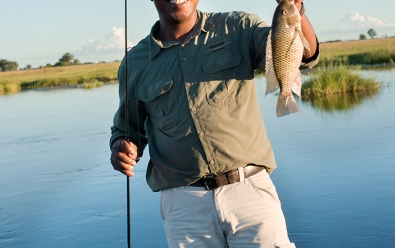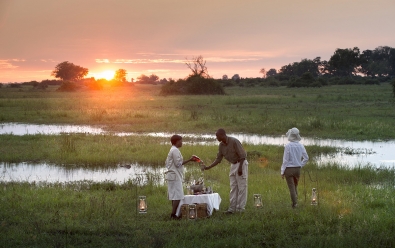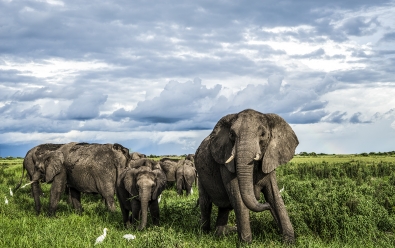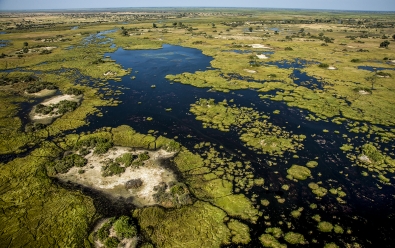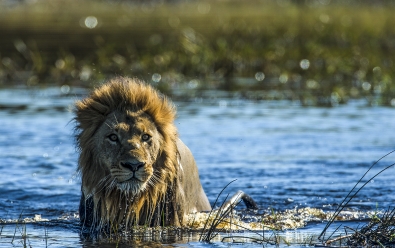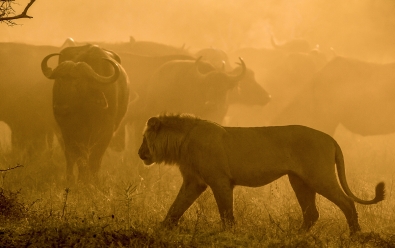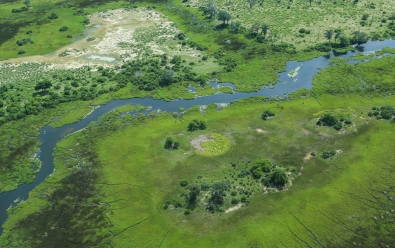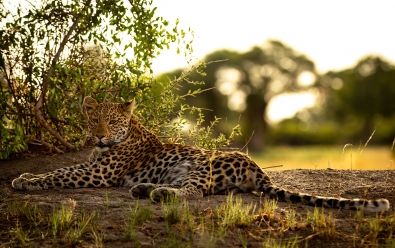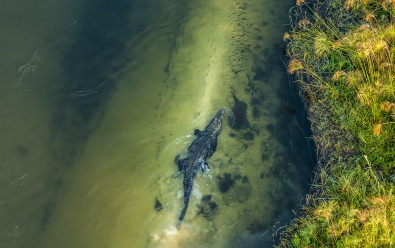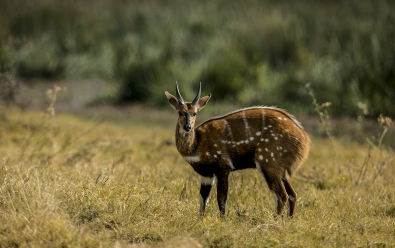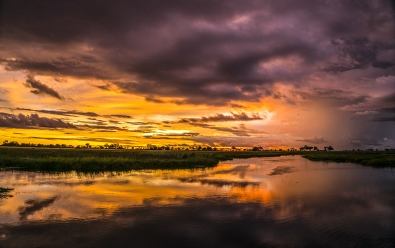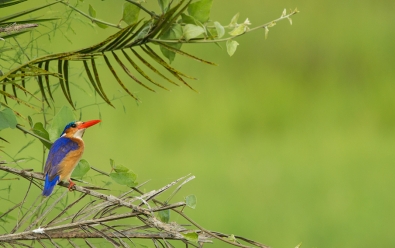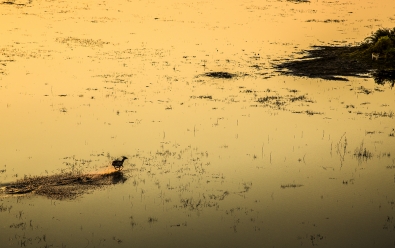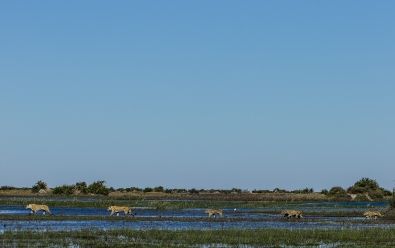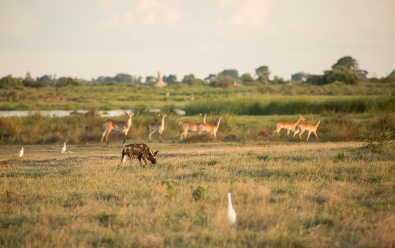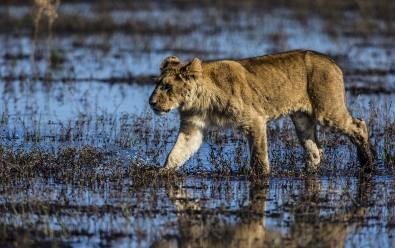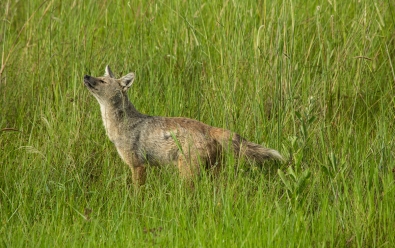Duba Plains Camp
Inquire for lodging prices
Highlights
- One of just two camps in an expansive and private concession.
- Excellent wildlife viewing on both land and water.
- Located in one of the Okavango's most beautiful areas.
- Luxurious accommodation, superb service, and fine dining.
Location
- NG23 Private Concession
- Northern Okavango Delta
- Northern Botswana
Duba Plains is a luxurious safari camp located in an area of the Okavango Delta that is rich in wildlife and offers water and land activities.
Duba is one of only two safari camps (the other being Duba Explorers Camp) in the 127-square-mile (330-sq-km) Duba Plains Reserve, so guests will enjoy a truly exclusive experience in this water-rich, Okavango Delta wilderness.
The camp overlooks the Duba plains, some areas of which become seasonally inundated with the Okavango's shallow floodwaters. The rich grasses attract large numbers of grazing wildlife, particularly buffalo and red lechwe, which are present in large herds. Elephants are also abundant.
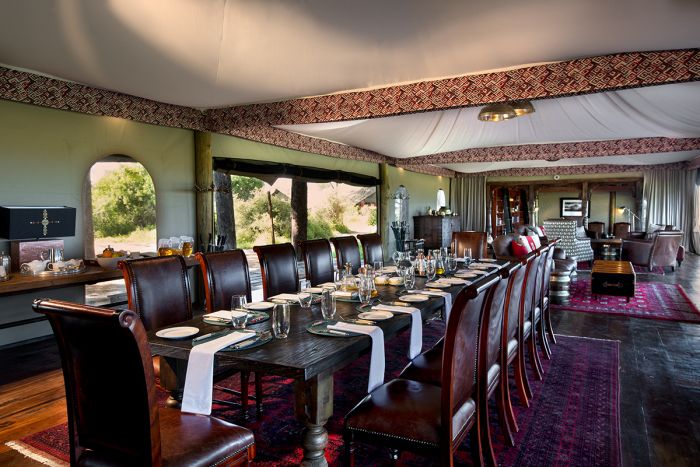
Main camp area dining room at Duba Plains Camp.
Duba Plains Camp is owned and operated by Great Plains Conservation, an organization whose mission is to blend sustainable tourism with the conservation of wildlife environments. Great Plains is headed by the husband-and-wife team of Beverly and Dereck Joubert, who are well known to wildlife enthusiasts for their outstanding films, most of which have been created in conjunction with National Geographic.
Great Plains use the term “Conservation Tourism” to describe what they do. They define it as the use of quality-led tourism experiences that are environmentally sound, with the benefits going specifically into making the conservation of an area viable and sustainable.
The Great Plains model takes stressed and threatened environments, surrounds them with compassionate protection and intelligent, sustainable management, and funds them with sensitive, low-volume, low-impact, tourism.
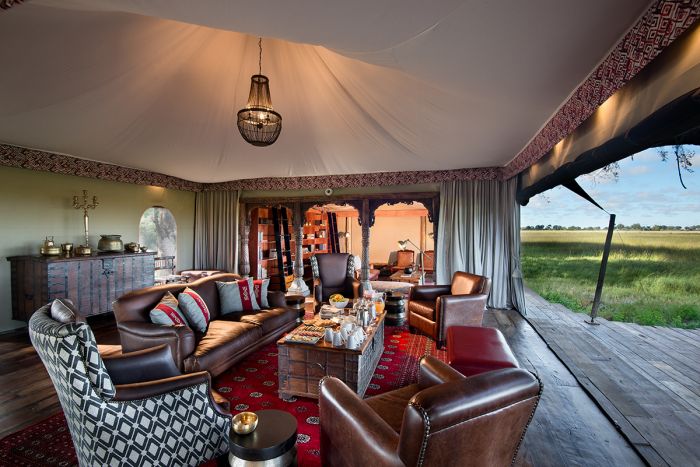
Guest lounge and view to the library at Duba Plains Camp.
Duba Plains Camp offers 6 guest suites, one of which is a two-bedroom villa suitable for two couples traveling together or a family of up to 5 guests. The open-plan tented suites are spacious, with an indoor lounge and an outdoor deck that includes lounge seating, a private pool, and a shaded outdoor sala and dining space overlooking the wetland and plains. The suites include plumbed, en-suite facilities with a luxurious tub, and both indoor and outdoor showers.
The main camp area is a spacious, tented structure built atop a raised deck and reminiscent of a luxury safari from the 1920s, with a lounge, library, indoor dining space, media center, interactive kitchen, bar, and wine storage. The main area opens onto a large front deck fabricated from reclaimed railroad ties with a campfire and outdoor dining space.
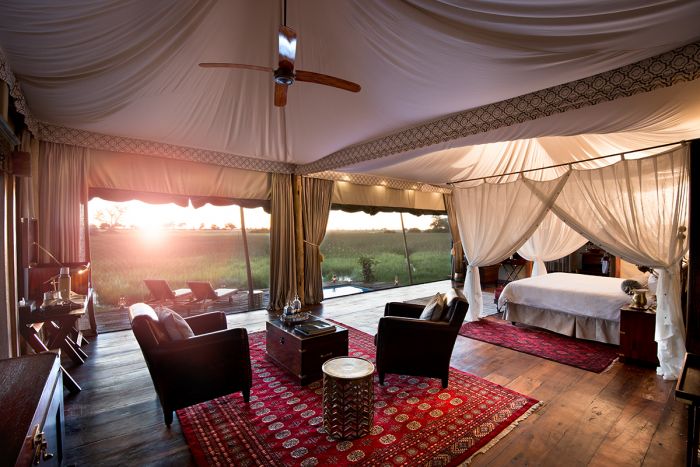
Guest suite interior at Duba Plains Camp.
Activities at Duba Plains Camp focus on game drives, both morning and afternoon, conducted in Toyota Land Cruisers that are customized to traverse the combination of wet and dry habitats around the camp. Full-day drives (with brunch delivered to the vehicle) are an option, as are short drives after dark to search for nocturnal wildlife activity.
Water-based activities offer a different experience and a safari on Duba's motorized, flat-bottomed, aluminum boat on one of the waterways (dependent on water levels) allows for up-close, but safe wildlife encounters, as well as superb birding, and views of life beneath the surface. Seasonal catch-and-release fishing is also offered. For those wanting to keep active, a guided bush walk is a nice way to see the little things that are often missed on a safari drive.
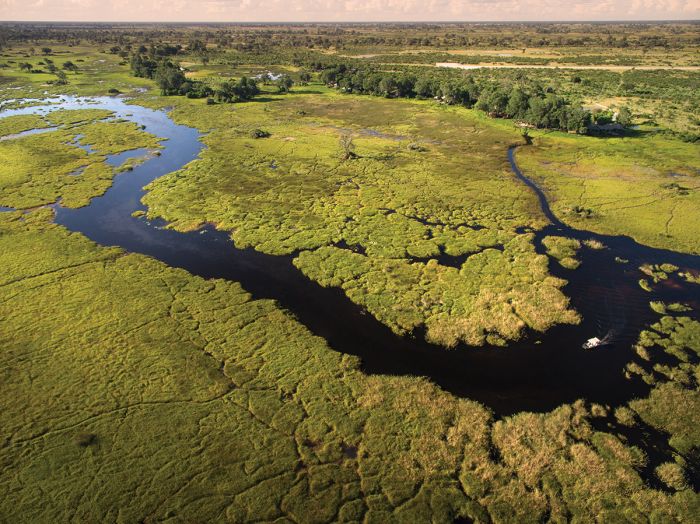
Boating in the flooded wetland in front of Duba Plains Camp (which can be seen in the tree line - top right).
Great Plains are one of Africa's leading safari operators and they strive to minimize energy consumption at all their camps. The entire camp was constructed using only recycled hardwoods and canvas. Moreover, all of the camp’s electricity comes from its solar farm, while ‘bio gas’ plants recycle waste into usable cooking gas.
Duba Plains Camp is at the top in terms of its environmental credentials and careful appointments. Strict eco-friendly environmental standards are maintained so that no harmful chemicals or waste is allowed to enter the pristine ecosystem of the Okavango Delta.
Duba Plains Camp is a Relais & Châteaux property.
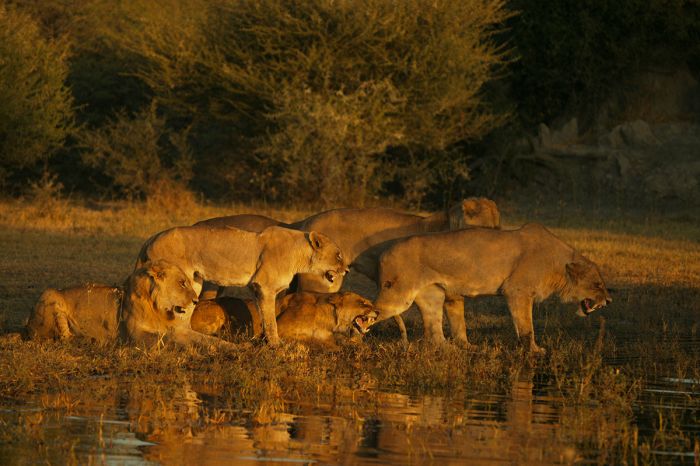
Lions about to cross water near Duba Plains Camp.
About the Okavango Delta
The Okavango Delta is one of Africa's greatest safari destinations and offers an incredible diversity and abundance of wildlife. The Okavango is an UNESCO World Heritage Site as well as a Ramsar Wetland of International Importance.
Often referred to simply as "the Delta", the Okavango is characterized by an ever-changing network of waterways that originate far to the northwest in the highlands of Angola. The Cubango River flows into northern Botswana and spills into the flat expanse of Kalahari sands, where it fans out into a shallow trough formed by tectonic faults beneath the sand.
The annual 'flooding' of the Okavango brings in rich sediments that provide nutrients atop the sands, which in turn creates a diverse ecosystem of permanent and seasonal waterways, deep-water lagoons, papyrus beds, palm-covered islands, seasonally flooded grasslands, and woodlands. The rich fresh-water environment changes year-to-year depending on the level of the floodwaters making it one of the most dynamic wildlife destinations on Earth.
Wildlife in the Okavango Delta is diverse and includes all of Africa's Big Five animals (lion, leopard, elephant, rhino, and buffalo. Commonly seen herbivores include giraffe, plains (Burchell's) zebra, blue wildebeest, impala, tsessebe, common reedbuck, greater kudu, waterbuck, buffalo, elephant, and warthog. Both species of rhino are found, albeit in small numbers. The Delta is also home to red lechwe and sitatunga, both of which are water-dependent antelopes.
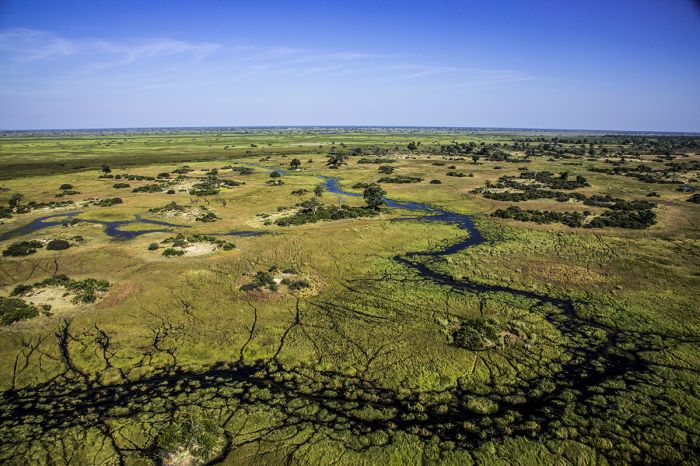
Classic and beautiful Okavango Delta scenery seen from above in the Duba Concession.
The abundance of herbivores means that predators are common in the Okavango. Commonly seen species include lion, leopard, spotted hyena, black-backed jackal, and African wild dog. Cheetah are sometimes seen in the larger grasslands like those on Chief's Island. Less frequently encountered predators include serval, caracal, honey badger, and various species of mongoose.
The abundance of water in the Okavango provides habitat for Nile crocodiles and hippos, both of which are seen easily at any of the safari camps located near the Delta's permanent water. Primates in the Delta include chacma baboon, vervet monkey, and bush baby (galago).
Birding is outstanding in the Delta, with over 400 species possible. A typical safari day can easily produce over 100 species for an avid birder.
ROOMS INCLUDES & EXCLUDES CHILDREN FACILITIES ACTIVITIES
Accommodation
6 guest accommodations in total comprising:
- 5 luxurious, double-bedded wood and canvas suites. A twin-bedded setup is also available.
- 1 two-bedroom tented suite (Duba Plains Suite). Read more about the Duba Plains Suite directly below.
Each guest accommodation is constructed atop elevated wooden decking with views of the beautiful floodplains surrounding the camp, which are part of a seasonal wetland. The fully-plumbed, en-suite facilities include a luxurious bath, indoor shower, outdoor shower, double-basin vanity, and separate toilet.
The guest suites are connected to the main camp area by sandy footpaths on the ground.
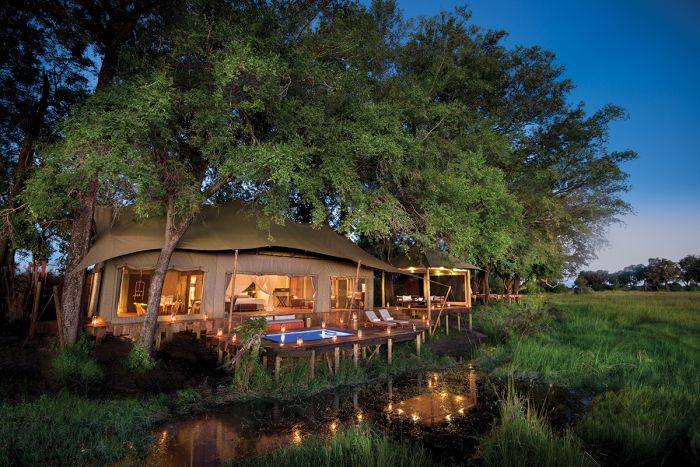
Guest suite exterior at Duba Plains Camp.
Duba Plains Suite
Located at the far end of the camp, the Duba Plains Suite is an exclusive-use, two-bedroom tented villa covering 6 533 square feet (607 sq meters) of combined indoor and outdoor space. The suite includes a private guide and safari vehicle, a dedicated host, and privately-served, chef-created meals.
Huge, ornate, wooden doors, open onto a spacious central lounge and dining space with the two bedrooms flanking this communal area on either side. The lounge features comfortable lounge seating, a dining table, a fully-stocked bar with refrigerated drinks, and a coffee-and-tea station. The lounge opens onto a wrap-around outdoor deck in the front of the suite.
Both bedrooms have a writing desk, a small lounge area, and an open-layout bathroom that includes a luxurious bathtub, indoor and outdoor showers, a twin-basin vanity, and separate flush toilet.
As with the standard one-bedroom suites, the Duba Plains Suite is constructed atop an elevated platform made from 100-year-old, teak railroad ties. The expansive outdoor deck includes two private pools (one for each bedroom) for relaxing during the midday, loungers, a campfire area with seating, and dining space for al-fresco meals. The deck offers 180-degree views over the wetland and floodplain grasslands.
The Duba Plains Suite can accommodate 4 adults sharing or a maximum of 5 guests for families with children.
The standard guest suites cover 2 600 square feet (242 sq meters) of combined indoor and outdoor space and include all imaginable creature comforts while still delivering a classic, tented-safari experience.
The suites are constructed atop elevated platforms made from 100-year-old teak railroad ties with expansive front decks that offer panoramic views onto the wetland and floodplain grasslands. The deck also includes a private pool for relaxing between activities, as well as a shaded sala for napping or dining.
Large and ornate, wooden doors lead into the open-plan interiors, which includes a lounge area with comfortable seating, a fully-stocked bar with refrigerated drinks of choice, and a coffee/tea station. The bedroom can be set up with a double-bed or separate twin beds.
The décor in the guest suites was chosen to blend into the surrounding Okavango wilderness and evokes a luxury safari experience like those from the 1920s.
Other items and features in all of the guest units include:
- Mosquito netting over the beds.
- Electronic safe.
- Standing fan.
- Solar-powered, environmentally friendly air-conditioning system over the bed.
- Fully-stocked bar with refrigerated drinks.
- Tea and coffee making facilities.
- Hairdryer.
- Yoga mats and free weights.
- Spinning bicycle available on request.
- One pair of high-quality binoculars and a professional camera body and lens kit for complimentary use. Photos will be downloaded to a memory stick on guest’s departure.
- Wi-Fi in the guest suites and main camp area.
- Multi-plug charging facilities for mobile devices.
- Personal amenities, including soap, shampoo, conditioner, and lotion.
Duba Plains Camp can accommodate a maximum of 15 guests in total: 2 guests in each of the five standard suites and up to 5 persons in the Duba Plains Suite.
Includes & Excludes
Includes:
- All meals and alcoholic and non-alcoholic beverages, including premium brand spirits and Champagne.
- Safari experiences (twice-daily or full-day game drives, bush walks, boating, subject to water levels, seasonal fishing, and birding) accompanied by an experienced guide.
- Laundry services are provided on a daily basis (weather permitting, items will be returned on the same day). Laundry is dried by the sun and on most days any laundry placed out in the morning will be returned by the evening.
- One pair of high quality binoculars and a professional camera body and lens kit for complimentary use. Photos will be downloaded to a memory stick on guest’s departure.
- Return, scheduled, seat-in-plane air transfers from Maun and/or Kasane Airports, as well as inter-camp air transfers from properties in the greater Okavango Delta and Linyanti/Savuti regions to this camp (subject to a minimum 2-night stay).
- Duba airstrip transfers.
- Duba Plains Camp traverses the central Duba Plains concession and is different to the area of the northern part of the concession, where Duba Explorers Camp is located. Guests at either camp cannot cross by vehicle from one side of the concession to the other due to deep water channels.
- Wi-Fi access.
- Tourism Levy & VAT.
Excludes:
- Purchases from the Great Plains Boutique.
- Spa services (in-room only as no separate facility).
- Scenic helicopter flights ranging in cost based on duration. Best to book in advance.
- Any applicable wildlife fee, park fee, reserve fee, concession fee, other land-use fee.
Single Supplement
A single supplement may apply for any room booked by a single traveler; please ask us for pricing.
Children
Children aged 6 years and older are accommodated at Duba Plains Camp:
- Triples for children sharing with adults can be arranged upon request.
- Child rates are applicable for one child aged 15 years and younger, sharing with two adults in a suite.
- Children 15 and younger must share a room with at least one adult.
- Children aged 16 years and older will pay applicable adult rates and be accommodated in a separate suite. Alternatively, families should consider booking the Duba Plains Suite.
- Families will be combined with other guests on all activities unless a private vehicle is booked at extra cost.
- Children can participate in walking activities from 8 years of age.
- Walking is possible from 6 years of age if guests are in the Duba Plains Suite or have confirmed the additional services of a private vehicle.
- Young children must be supervised by their parents, as the camp is not fenced and is located in an area with high predator densities and there is water surrounding camp. The camp also features raised decks and pools which are not covered.
- The Great Plains Young Explorers program is thoughtfully designed to give children a range of experiences and topics from birding to cooking to art to wildlife tracking.
Facilities
Duba Plains Camp is situated in one of the most scenically beautiful in areas of the Okavango Delta, with both seasonal and permanent waterways, numerous palm-fringed islands, and rolling grasslands.
The communal camp area is centered around a large, open-plan, wood-and-canvas structure that includes a dining area, lounge, library, media center, wine storage, and interactive kitchen. The structure is built open a slightly-elevated, hardwood deck that extends onto an expansive outdoor space that is used for al fresco dining and also includes a campfire area with seating.
The entire camp was constructed using only salvaged wood and includes plenty of custom art created by Keith Joubert, as well as Beverly Joubert's photographic images.
The camp’s electricity comes from its solar energy system with a generator for backup power.
Main guest area facilities include:
- Central lounge, library, dining room, wine storage, bar, interactive kitchen, and a coffee/tea station.
- Expansive deck with fire pit, seating, and dining space.
- Dining is typically communal, but private dining is available on request.
- All dietary requirements are catered for, from regular to vegan to children; prior notice required.
- There is no dedicated spa space at Duba Plains, but in-room massages are offered. Treatments are at an additional cost.
- Yoga mats and free weights are included in each suite. A spinning cycle is also available on request.
- The Great Plains Safari Boutique offers locally and regionally-produced crafts, many of which support local community projects in the nearby Okavango panhandle. The Boutique also stocks Dereck and Beverly Joubert's clothing line, which is a bespoke range of clothing they typically wear and which is ideal and cool while on safari, yet also elegant when in the city. All materials are responsibly sourced.
- Complimentary Wi-Fi access.
- Mobile phone signal unavailable.
- Mineral water is provided in the main camp areas and in the guest suites.
- The camp is run by a solar panel array with a generator available as a back-up. The system produces 220-volt, 24-hour electricity to the suites and main areas. There are universal plug points in each suite.
Activities
Activities included in the rate:
- Twice daily (or full-day with picnic lunch) game drives. Drives after dark are also offered. The vehicles are custom-built Land Cruisers that are designed specifically for the conditions around the camp and photography (fold-down screens, raised roofs, photographic bars, multi-plug inverters) with seven individual bucket seats.
- During winter months, hot water bottles (on early morning game drives only), blankets, and lined ponchos are provided.
- Guided walks led by licensed guides with firearm training.
- Each guest suite includes the use of a professional camera body and lenses. Photos will be downloaded to a USB flash stick on guest’s departure. The suites also include a pair of high-quality binoculars for use during your stay.
- Birding.
- Boating on the camp's flat-bottomed, aluminum boat to explore the channels of the Okavango Delta. Boating is dependent on water levels.
- Seasonal fishing (between March and December) in one of the nearby waterways. A rod-and-reel kit is available for those who want to try their casting at the local bream on a catch-and-release basis.
Optional activities at additional cost:
- Private activities are on offer (subject to vehicle availability which needs to be booked in advance). Note that guests staying in the Duba Plains Suite are assigned their own private guide and game-drive vehicle.
- Scenic helicopter flights ranging in duration from 30, 45 to 60 minutes. The activity is best between 11:00 and 15:00, when animal densities are high. Must be booked in advance.
Example of a typical day:
- Early morning wake-up call. Morning wake-up and activity times vary according to the seasons, activities on offer, and wildlife sightings.
- Light breakfast before departing on the morning activity.
- Return to camp for a meal and rest period.
- Meet for afternoon tea and snacks (savory and sweet choices) before departing on the activity.
- Return to camp - freshen up or meet for drinks, followed by dinner.
- Enjoy a nightcap or discussion around the fire before retiring.
Great Good Fair Poor
- Jan
- Feb
- Mar
- Apr
- May
- Jun
- Jul
- Aug
- Sep
- Oct
- Nov
- Dec
WHEN TO GO
The Okavango Delta offers very good wildlife viewing opportunities all throughout the year, but there are seasonal variations in terms of weather that may be a consideration when planning your visit.
The high season in terms of tourist demand is during the dry months between June and October. The latter part of the rainy season is the low season.
The winter (June through August) is dry and cool and wildlife may be easier to find as rain water is evaporating and the rivers and deeper waterholes become more frequently visited by the animals.
During the middle and later stages of the rainy season, the grass becomes tall and the bush becomes lush and thick, which makes for lovely colors, but makes spotting wildlife more difficult.
Duba Plains Camp is open year-round.
Summer / Rains
Northern Botswana, including the Okavango Delta receives most of its rain between December thru February, which is the summer season. November and December are wonderful months to visit the Delta, with only occasional rainstorms and most rain coming in short showers, which bring relief to the thirsty land after the dry season.
January and February typically experience afternoon downpours on most days, but all-day rain is very uncommon. By the middle of March, the rains become much less frequent and the grass and bush have grown long and thick. Mornings become cooler by the end of March.
In spite of being summer, the rains keep temperatures from becoming overly hot, although humidity and insect life are at their peak. Days are mostly overcast or partially cloudy, with dramatic skies and a lovely green color to the landscape. Afternoon temperatures average 88°F (31°C), but mornings are very comfortable at around 65°F (19°C).
Baby animals are in abundance, especially impala lambs and warthog piglets. Migratory birds arrive to breed and dramatically increase the number of species and overall numbers, particularly in the lagoons and pans, which are full of rain water and food for the aquatic species.
Unlike the dry months (May through October), when the middays can be very warm, causing wildlife to minimize activity and seek shade from around 10am til mid-afternoon, the overcast skies in the summer often mean that animals are active throughout the day, offering many more hours of game viewing.
Autumn
March, April and May are Fall season months and the beginning of the dry season in the Okavango, with rains very uncommon from around mid-March. The landscape is still lush and green, with sunny days and comfortable temps; afternoons average 84°F (29°C). Mornings are comfortable, but a fleece and base layer may be needed for the first hours on game drive.
Migrant birds fly north and water in the lagoons and rain pans is drying up. Permanent waterways in the Delta are however rising, as the 'flood' water from the Angolan highlands is now reaching the Delta.
Morning temps are around 54°F/12°C and afternoons average 79°F/26°C.
Winter / Dry Season
June through August is winter and the vegetation is drying and going dormant. The Okavango flood water is peaking but the surrounding landscape is mostly brown and yellow. Dust and sand particles in the air is on the rise. Game viewing is superb, with elephant and buffalo herds congregating along permanent water.
Mornings can be chilly to very cold at around 45°F (7°C). Warm clothes, including winter hat and gloves are needed for the open-air game drives. Dress in layers, as the temps do rise quickly during the day, with middays reaching 79°F (26°C).
Spring
September and October are the driest months as the landscape and animals eagerly await the coming rains. Game viewing is phenomenal, with all lagoons and rain pans completely dry and animals congregating around permanent waterways. The flood levels are down and the grass and vegetation mostly dried.
Days are warm, sunny and often cloudless and by mid-morning, most animals are seeking shelter in the shade and awaiting the evening temps to drop. October can be brutally hot and dusty and even smoky as sporadic grass fires can occur.
Safari camps are mostly full to capacity, with guests adhering to guide books saying this is the only tome to visit (not true of course!) Temperatures in October can easily reach 95°F (35°C) or even hotter.




